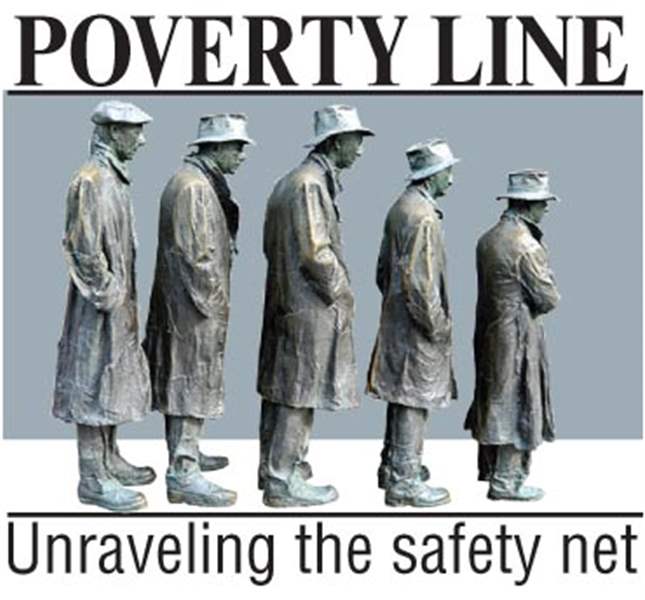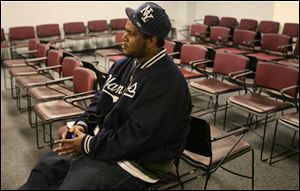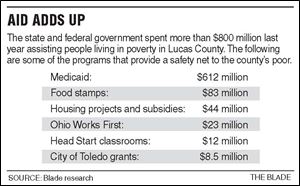
POVERTY LINE
Toledo agencies that offer aid fear what's over horizon
Jobless benefits won’t last forever
2/22/2009

Matthew Stookey, left, laid off from a construction job, filed recently for unemployment and fears he won’t find a new job.
With the national economy battering the Toledo area, The Blade this year will examine poverty and the region's readiness for the turmoil caused as more people lose their jobs. Today, we look at the situation so far.
The line is growing for assistance, and no one seems to know where it will end.
The Toledo area is badly bruised from the pounding of the national economy's problems.
A paralyzed job market worsened by the sharp downturn in the automotive industry has led to an unemployment rate hovering around 10 percent in Toledo, the highest among Ohio's metro regions.
READ MORE: Poverty Line -- Unraveling the safety net
Since the start of the year, 10 major regional employers from Toledo to Bowling Green to Van Wert have shuttered or announced large layoffs, wiping out more than 1,300 jobs and adding to the tens of thousands of people looking for work.
A Blade analysis shows that the state and federal government spent more than $800 million on programs for low-income and disabled residents last year in Lucas County, the largest population center in the region.
But even with the spending on food, housing, education, and unemployment services, the people managing organizations that assist low-income families have grave concerns about what will happen when unemployment benefits collected by tens of thousands of people across the area expire.
"I've never seen it quite this bad," said James Caldwell, president and chief executive officer of the Toledo Northwest Ohio Food Bank.

Cedric Mills, out of work for months and on the verge of poverty, said he never expected to be in this situation.
"I've never seen it quite this challenging. I think this is a whole new chapter for this country."
The numbers bear out a frightening portrait of poverty:
- More than 98 percent of the housing units controlled by the Lucas Metropolitan Housing Authority are occupied. LMHA, an arm of the federal government, offers subsidized housing and housing vouchers to county residents and reports increased inquiries about in housing in recent months.
- The Lucas County Department of Job & Family Services issued food stamps last year to 75,159 people, a 10 percent increase from the 68,624 in 2007. The number is up 47 percent from the 50,925 receiving the assistance in 2002.
- In December, 127,641 families, adults, seniors, and children a 23 percent increase from the number a year earlier sought food from the Toledo Seagate Food Bank of Northwest Ohio.
In addition, United Way reports a sharp increase from a year ago in the number of calls to its 2-1-1 call center, which helps direct low-income people to services such as utility-payment assistance, food, furniture and appliances, and rent payment.
The Rev. Dan Rogers, president and CEO of Cherry Street Mission Ministries, which houses and feeds the homeless, said local programs in the past have been able to keep up with the demand for assistance.
But with an unknown number of people in the pipeline to poverty, he said the community must prepare itself.
"I have major concerns," said Mr. Rogers, whose organization has experienced a doubled demand for its services during the past six years.
"I don't know the watershed."
He added, "It is bleak, but the silver lining is that right now as a community we are still ahead of it. But we need to change our thinking."

Discouraging numbers
Numbers don't really explain poverty nor the human toll the economic downturn is having on the region, but they are a starting point to understanding how vast the problem is and has been for many years.
Of the 445,281 Lucas County residents, 75,697, or 17 percent, live below the federal poverty line, according to the most recent U.S. Census estimates.
The poverty line is calculated by the federal government as a yearly income below $21,834 for a family of four.
An individual is considered poor if he or she makes less than $11,201 a year.
The federal guidelines say a person 65 or older is poor if he or she makes less than $10,326 a year.
Poverty benchmarks are pegged to food costs and were established in the 1960s.
In 2007, Toledo's median household income half were below and half were above was $35,216, ranking the city the 10th poorest of major U.S. cities. Toledo's neighbors to the north and east Detroit and Cleveland, respectively, ranked as the two poorest cities in the country in the Census report released in August.
Bill Kitson, president and CEO of United Way of Greater Toledo, said that accounting for the need in Lucas County is daunting.
"We really don't have a handle on the number of people who are in need," he said.
"We have indicators that keep pointing up.

"The people who do this for a living are experiencing need that they haven't seen before. We are in the middle of something that we haven't got our hands around."
The plan for combating poverty calls for spending hundreds of millions of dollars on programs for people who need assistance.
The more than $800 million spent by the state and federal government in Lucas County stands to grow by millions under the stimulus bill signed by President Obama last week.
The total includes $612 million on Medicaid, nearly $83 million for food stamps, $23 million for Ohio Works First, $12 million for Head Start classrooms, $44 million for housing projects and subsidies, and $8.5 million in grants for the city of Toledo.
A call for prevention
"Money is not our problem," said Mr. Rogers of the Cherry Street Mission, near downtown Toledo.
Agencies such as his, he said, of course need funds to help the homeless, but organizations that work with poverty need to do a better job of preventing people from falling into despair and homelessness.
The state, county, and city each has programs focused on combating poverty.

Angela Rios, a nursing student and single mother of 1-year-old Alina, is representative of a new group, those in ‘situational poverty’ because of circumstances such as job loss.
In June, Toledo Mayor Carty Finkbeiner announced plans to fight poverty neighborhood by neighborhood with the help of a new anti-poverty commission.
Gov. Ted Strickland also launched an anti-poverty task force last year to assist Ohio's 1.5 million low-income residents.
The vast majority of people who need help locally are getting it through the Lucas County Department of Job & Family Services, an agency that works as the pass-through for most of the state and federal assistance that reaches residents.
Changing times
Deb Ortiz-Flores, the agency's executive director, is anticipating the agency will face another round of deep fund cuts as the state contends with a budget crisis.
The agency recently laid off employees, even as the volume of requests for help is increasing.
Ms. Ortiz-Flores has noticed a difference in the people her agency is serving.
"The face of poverty has changed," she said. "It used to be a lot of women carrying babies. Now there are a lot of single men."
Some of the needy are part of what is known as "generational poverty" people who come from low-income families who continue to look for assistance as adults.
Others, like Angela Rios, 21, reflect a new group, people in "situational poverty" because of circumstances such as a job loss or a health-care crisis.
Ms. Rios, 21, single mother of Alina Ruiz, 1, is having trouble finding work waiting tables.
"I can't find a job right now," said Ms. Rios, a nursing student at Owens Community College. "I've called everywhere to find a job waitressing, and no one is hiring."
As the economy worsened in the autumn amid the banking crisis, the numbers of people calling the county for assistance jumped from about 47,000 in August to 72,000 in October a 53 percent increase according to statistics from the Department of Job & Family Services.
Cedric Mills, 26, of Toledo is among the thousands of Toledoans out of work, relying on government assistance, and on the verge of poverty.

Mr. Mills, who has two children, worked in landscaping and construction, typically making $60 to $70 a day before the job market dried up.
"They basically give me the same story," Mr. Mills said as he waited in the lobby of the Lucas County Department of Job & Family Services recently.
"Now there are no jobs at all."
Mr. Mills said he never expected to be among the many looking for assistance from the county.
"It's very frustrating," he said. "I don't like being down here. My kid needs diapers. He needs all types of stuff."
These days, the lobby of the Job & Family Services is packed with county residents looking for help.
"The traffic down here is like a stampede," Mr. Mills said.
Hoping for opportunity
More than 400 people showed up for a "mini" job fair this month at The Source, Lucas County's "one-stop shop" to match job hunters with training and employment.
And for a week in mid-January, Lucas County led the state in new first-time jobless filings as 3,138 county residents made initial requests for unemployment benefits.
Matthew Stookey, 40, of Toledo, who was recently laid off from his construction job in Sylvania, was among those waiting in line and hoping for a job opportunity.
"I was basically maintaining as a single parent, paying all my bills," said Mr. Stookey, who lives in an apartment with his 7-year-old son.
"Now I don't know what we re going to do."
Mr. Stookey said he has called for food stamps and filed his paperwork for unemployment.
But he's worried he won't find a job in the most difficult economy in a generation.
"It is going downhill fast and I know I'm not the only one in this situation," he said.
He said there's a chance he ll be recalled for his job, but he isn't counting on it.
"In the meantime, I've got to do what I've got to do to pay the bills, or I'm going to be living at the Cherry Street Mission."
"They keep saying this is going to get better, but it doesn't happen over night."

Assessing need
Mr. Caldwell, of the Toledo-Northwest Ohio Food Bank, said he is hoping that the nearly $800 billion stimulus package signed last week by President Obama will be the silver bullet for fighting poverty.
He's also hoping that lawmakers act on plans to quell the foreclosure crisis, as well as additional lifelines for the automotive industry.
He thinks it ll take up to two months once the stimulus package and other proposals are approved before local organizations working with the poor have the information necessary to assess exactly what they are facing in terms of need in the years ahead.
In the meantime, Mr. Caldwell, who has been associated with the food bank for about 25 years, said need has increased by 15 to 20 percent this year from last year.
"The people that used to donate to us are now some of those individuals in those pantry lines being served themselves."
Looking for work
After 16 years of employment as a machinist, Julius Helinski, 54, of Toledo, is back in line looking for work.
As the economy worsened, Mr. Helinski and his wife, who is self-employed, had a feeling his job might be cut.
"We just didn't know when," Mr. Helinski said during the job fair at The Source this month. "The economy is going to get worse before it is going to get better."
"People have got to prepare themselves."
Contact Steve Eder at:seder@theblade.com or419-304-1680.